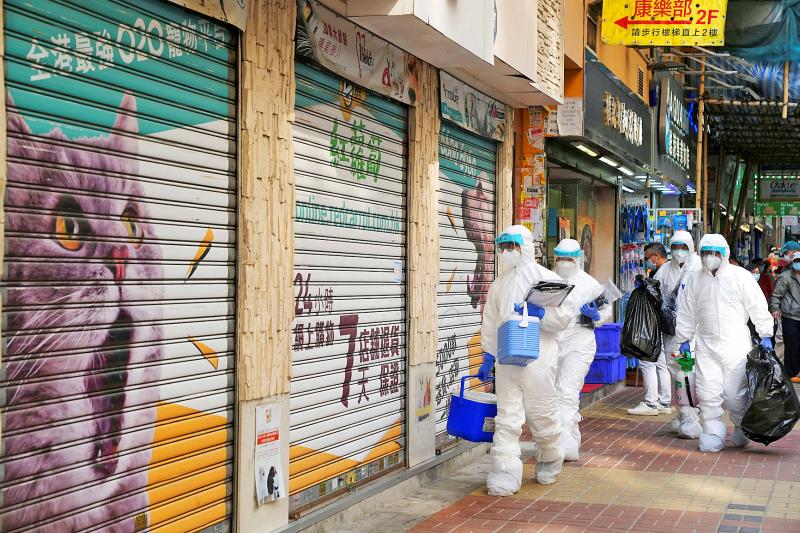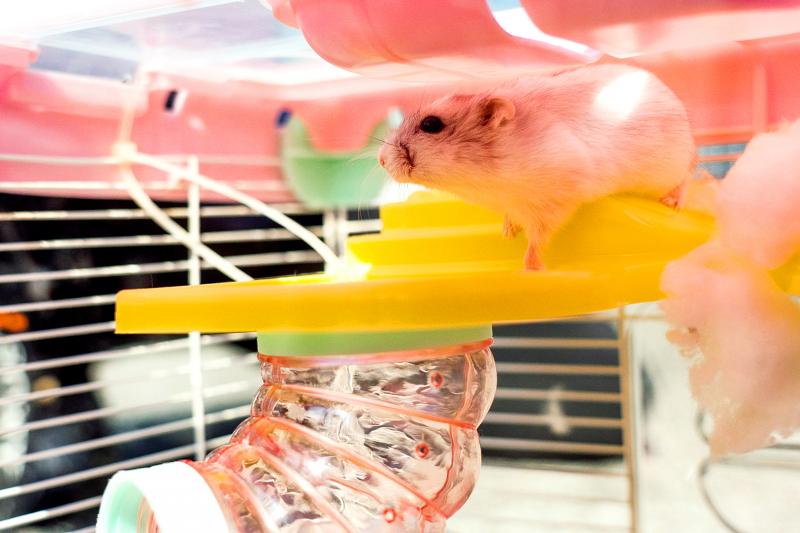Hong Kong’s government yesterday faced outrage over its decision to cull hundreds of small animals after hamsters in a store tested positive for COVID-19.
Like China, Hong Kong maintains a staunch “zero COVID” policy, stamping out the merest trace of the virus with contact tracing, mass testing, strict quarantines and prolonged social distancing rules.
Its latest measures target hamsters and other small mammals — including chinchillas, rabbits and guinea pigs, which authorities on Tuesday said would be culled as a “precautionary measure.”

Photo: Reuters
The drastic move came after hamsters sold at the Little Boss pet shop tested positive for the Delta variant of SARS-CoV-2 — now rare in Hong Kong.
Officials in personal protective gear carried red garbage bags marked with biohazard warnings out of the shop on Tuesday night.
Authorities “strongly encouraged” anyone who bought a hamster after Dec. 22 last year to give up their pet for culling.

Photo: AFP
Animal lovers across Hong Kong reacted with alarm: The Society for the Prevention of Cruelty to Animals (SPCA) denounced the decision and a Change.org petition garnered more than 23,000 signatures in less than a day.
“The SPCA is shocked and concerned over the recent announcement about the handling of over 2,000 animals,” it said in a statement yesterday. “We urge pet owners not to panic or abandon their pets.”
One hamster lovers’ group said it received more than 20 inquiries about whether owners had to give up their furry friends.
Authorities on Tuesday said that the COVID-19-positive creatures were believed to be imported from the Netherlands.
“Internationally, there is no evidence yet to show pets can transmit the coronavirus to humans, but ... we will take precautionary measures against any vector of transmission,” Hong Kong Secretary for Food and Health Sophia Chan (陳肇始) told a news conference.
About 1,000 animals sold at Little Boss and another 1,000 hamsters in dozens of pet shops across Hong Kong would be culled, authorities said.
The import of small mammals has also been banned.
One owner — who bought her pet on Jan. 1 — reacted in defiance.
“No one can take my hamster away unless they kill me,” she told the Standard newspaper yesterday.
She pushed back on the government’s mass cull, recalling a recent birthday party attended by officials that resulted in multiple COVID-19 infections and left Hong Kong’s leadership red-faced.
“Will they also kill all infected COVID-19 patients and their close contacts?” she said. “If all people who attended the birthday party are culled then I will hand my hamster to the government.”
A grim humor settled on Hong Kong-centric social media accounts, with people publishing illustrations of hamsters wearing surgical masks or facing off against the Grim Reaper.
However, the government’s decision has some supporters.
Microbiologist Yuen Kwok-yung (袁國勇), who is also a government adviser, praised the measure as “decisive” and “prudent.”
Some heeded the call to give up their rodents yesterday, with one man saying he agreed with the authorities’ rationale of limiting the spread of the virus, local broadcaster RTHK reported.
Asked about Hong Kong’s hamster cull, the WHO said some animal species can be infected with COVID-19, and animals can reinfect humans.
“That risk remains low, but it is something that we are constantly looking at,” said Maria Van Kerkhove, technical lead of COVID-19 response at the WHO.

Kehinde Sanni spends his days smoothing out dents and repainting scratched bumpers in a modest autobody shop in Lagos. He has never left Nigeria, yet he speaks glowingly of Burkina Faso military leader Ibrahim Traore. “Nigeria needs someone like Ibrahim Traore of Burkina Faso. He is doing well for his country,” Sanni said. His admiration is shaped by a steady stream of viral videos, memes and social media posts — many misleading or outright false — portraying Traore as a fearless reformer who defied Western powers and reclaimed his country’s dignity. The Burkinabe strongman swept into power following a coup in September 2022

‘FRAGMENTING’: British politics have for a long time been dominated by the Labor Party and the Tories, but polls suggest that Reform now poses a significant challenge Hard-right upstarts Reform UK snatched a parliamentary seat from British Prime Minister Keir Starmer’s Labor Party yesterday in local elections that dealt a blow to the UK’s two establishment parties. Reform, led by anti-immigrant firebrand Nigel Farage, won the by-election in Runcorn and Helsby in northwest England by just six votes, as it picked up gains in other localities, including one mayoralty. The group’s strong showing continues momentum it built up at last year’s general election and appears to confirm a trend that the UK is entering an era of multi-party politics. “For the movement, for the party it’s a very, very big

ENTERTAINMENT: Rio officials have a history of organizing massive concerts on Copacabana Beach, with Madonna’s show drawing about 1.6 million fans last year Lady Gaga on Saturday night gave a free concert in front of 2 million fans who poured onto Copacabana Beach in Rio de Janeiro for the biggest show of her career. “Tonight, we’re making history... Thank you for making history with me,” Lady Gaga told a screaming crowd. The Mother Monster, as she is known, started the show at about 10:10pm local time with her 2011 song Bloody Mary. Cries of joy rose from the tightly packed fans who sang and danced shoulder-to-shoulder on the vast stretch of sand. Concert organizers said 2.1 million people attended the show. Lady Gaga

SUPPORT: The Australian prime minister promised to back Kyiv against Russia’s invasion, saying: ‘That’s my government’s position. It was yesterday. It still is’ Left-leaning Australian Prime Minister Anthony Albanese yesterday basked in his landslide election win, promising a “disciplined, orderly” government to confront cost-of-living pain and tariff turmoil. People clapped as the 62-year-old and his fiancee, Jodie Haydon, who visited his old inner Sydney haunt, Cafe Italia, surrounded by a crowd of jostling photographers and journalists. Albanese’s Labor Party is on course to win at least 83 seats in the 150-member parliament, partial results showed. Opposition leader Peter Dutton’s conservative Liberal-National coalition had just 38 seats, and other parties 12. Another 17 seats were still in doubt. “We will be a disciplined, orderly